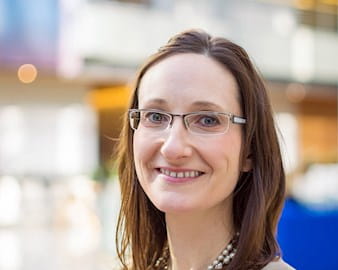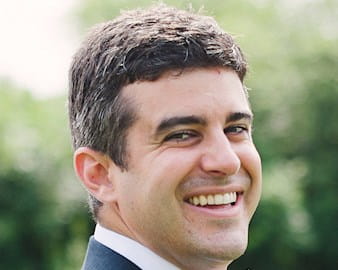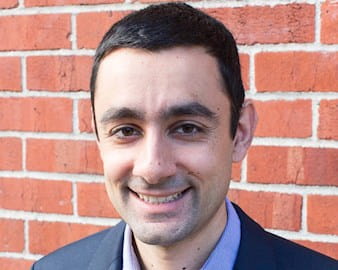
Alumni and students explain their passion and preparation for a career in healthcare.
- By
- January 10, 2016
- Healthcare

Chicago Booth Magazine reached out to students and alumni in the healthcare industry to find out what impelled them to enter the sector, and how their Chicago Booth educations prepared them to meet the challenges of their jobs.
With a background as an engineer, radiologist, educator, and entrepreneur, Dr. Pat Basu is the chief medical officer of Doctor On Demand. Previously on the faculty of Stanford University, Dr. Basu was awarded a White House fellowship in 2010, and he was named the winner of the 2011 Distinguished Alumni Award for young alumni. Chicago Booth Magazine: What experiences convinced you to get into the healthcare field?
Dr. Basu: I've always loved people and science. In a way I've felt that medicine blends the fields of science and humanity, such that the science is always interesting and the humanity is always gratifying. During my time at the University of Chicago, I set a life goal to try to help improve health care for 100 million people or more. So as a physician, as a White House Fellow, as an executive, and as an entrepreneur, that has always been the drive.
CBM: How did your Chicago Booth education prepare you for the challenges you have faced in that field?
Dr. Basu: My Chicago Booth education prepared me greatly for this—and my comments at the 2011 Distinguished Alumni Award speech spoke to this. I always looked at the problems in health care not to be about a lack of talent—doctors tend to be smart and driven—or a lack of resources, because the sector consumes nearly a fifth of our GDP. It’s more about "business" problems. Better management, proper allocation of people and capital, better systems, more efficient processes, and better deployment of IT. The rigorous education made me a much more analytical executive and a more confident entrepreneur. Booth courses in economics still drive my philosophies on management, Booth courses on finance still drive the way I think of mergers and acquisitions, and the New Venture Challenge and management labs represent true work experience, given the ultimate professional and life lessons I learned there.

Serena Hohmann is a student in the Full-Time MBA Program pursuing concentrations in general and strategic management. She has a master's degree in Latin American Studies from the University of Chicago, and she is a co-chair of both the Health Care Group and Net Impact. During the summer of 2015, Serena lead a cross-functional team at Baxter International in evaluating whether to pursue a geo-expansion of the franchise’s flagship fluid systems product into the Latin American region.
CBM: What experiences spurred you to get into the healthcare field?
Hohmann: I did my master's at the University of Chicago in Latin American Studies. I performed fieldwork for my master's thesis in southern Mexico looking at how to build effective public/private partnerships between nonprofits and state entities that provide medical and legal services to women. During this research, I worked both on mental health and more traditional reproductive and primary care services. This experience really sparked my interest in healthcare.
CBM: How has your Chicago Booth education helped prepare you for the challenges you have faced in that field?
Hohmann: One of the reasons I came to Booth was to pursue the corporate healthcare track and to look at improving access and health delivery in Latin America. Booth has prepared me for a career in the healthcare industry in several ways that make it really unique. First, the network and connections have allowed me to learn more about domestic and international payers, providers, and patients. It’s a very international student body, and a lot of classmates and alumni have had extensive healthcare experience. Also, the flexible curriculum has allowed me to take two courses at the Harris School of Public Policy focused on health policy. Finally, the student Health Care Group itself has exposed me to healthcare investing, which I didn’t have a lot of familiarity with prior to Booth.

Dane Guarino is cofounder of Markit Medical (along with fellow Booth student Lance Larsen), a healthcare technology startup that shows patients receiving a physician referral what all of their in-network options are, what each is going to cost the patient out-of-pocket, as well as quality and convenience information. Previously Dane worked as an investment banker, helping early stage healthcare technology companies raise capital and sell themselves.
CBM: What experiences spurred you to get into the healthcare field?
Guarino: I had just switched careers to become an investment banker and I was working on healthcare, software, clean technology, and education. At the same time, I started to develop a sinus issue, so I was going in to see an ear, nose, and throat specialist at Northwestern fairly frequently. You go to what you believe to be one of the best academic hospitals in the country, and I was shocked to see that everything was managed on paper. Looking around the room, there was super old technology. It clicked for me that healthcare was a great opportunity. I knew healthcare technology was becoming bigger by the day, as some of the more innovative health systems were starting to think about how to employ technology. I ended up working on a lot of awesome healthcare tech deals.
CBM: How has your Chicago Booth education prepared you for the challenges you have faced in that field?
Guarino: I realized I enjoyed working with these earlier-stage companies on their stories, on their operations, sales, and marketing, and I wasn’t as much enjoying the investment banking duties I was doing at the same time. So I decided to come to Booth and learn how to be an entrepreneur. At Booth, I took Entrepreneurial Discovery right away, taught by Mark Tebbe and Brian Coe. Brian Coe is a very healthcare-focused professor, and the point of the class is to pick an industry and focus on where there’s a big need for innovation. I met my cofounder and we started doing that sort of work on the side. We took Building the New Venture, taught by Waverly Deutsch, and that taught the strategies, mindsets and processes for how to get a company off the ground. Also vital were Entrepreneurial Selling, learning how to sell your product at the early stages, and Marianne Bertrand’s class about the nonmarket environments. In healthcare, you have so many policy and legal issues, and there are all kind of different ways to get sued, so I really learned a lot in that class about how to navigate that landscape. James Schrager's New Venture Strategy was extremely helpful in thinking about early stage strategies, how you determine what sort of company you are and what the key questions are that you need to be able to answer. I left that class every day feeling I had learned 20 new things I could apply directly to what I was doing in my start-up.

Borna Safabakhsh is a software engineer and healthcare entrepreneur in Silicon Valley, and the cofounder and CEO of AgileMD, a digital health startup reinventing how physicians interact with clinical data and tools at the bedside. AgileMD’s clinical tools are used at over 300 hospitals by 50,000 healthcare providers to deliver high-quality care. While getting his MBA from Chicago Booth, Safabakhsh was recognized as "Most Promising Entrepreneur" by the University of Chicago and "50 for the Future" by the Illinois Technology Foundation.
Chicago Booth Magazine: What experiences convinced you to get into the healthcare field?
Safabakhsh: I’m trained as a software engineer, and I always worked on how software can help people make complex decisions. I previously worked on how to make cars more intelligent. At IBM, I worked on their security group, using software to identify fraud more effectively. When I came to Booth, I was put in touch with doctors at University of Chicago Medical Center. I became fascinated by the fact that you could have three or four doctors on a team at a top-tier hospital all presented with the same case, all trying to do the right thing, yet with different approaches to treating the patient.
I struggled with this—medicine is a science and some approaches must be better than others, right? That’s what Agile is about—putting the software and technology in place to collect the data to understand the outcomes of various care paths and then align the way that doctors and nurses are delivering care along those that work best.
CBM: How did your Chicago Booth education prepare you for the challenges you have faced in that field?
Safabakhsh: Very broadly, it’s both competence and confidence. On the competence front, there’s a lot that goes into starting a company, and many new problems that I don’t have the answer to. We are selling fundamentally new products to hospitals. From a marketing perspective, how do we know where we start? Who is our customer, how do we sell to our customer, and how do we price something like this? On the internal side, how do you manage a team? How do you set up an organization? How do you manage your cash flow to make payroll every month? Coming from my background as a software engineer who was writing algorithms, I had essentially zero understanding of these things before Booth.
Then there’s also having the confidence to undertake a new venture like Agile. There are many aspects to starting a new company and we can only afford to make a few big mistakes. Booth gave us the confidence to take these challenges on and solve them one step at a time, knowing that we are better trained and at least as prepared as anyone else out there.
We'd love to hear your Booth memories, stories, connections...everything.